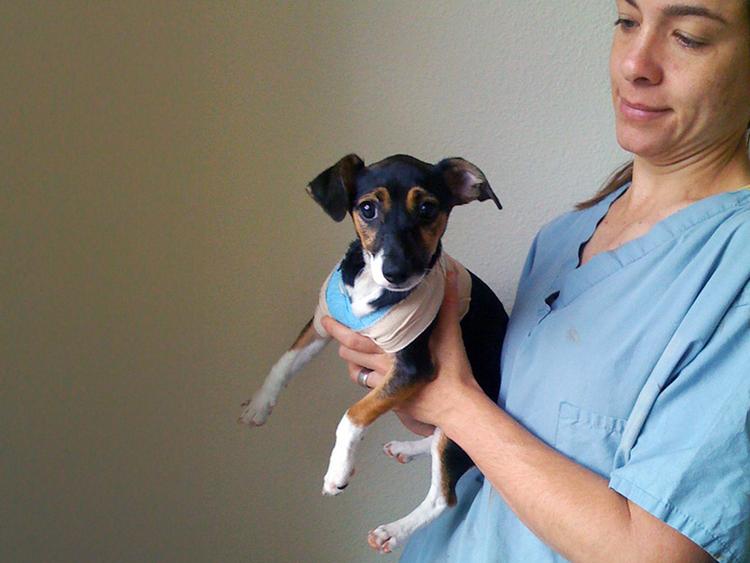Should a Puppy Be a Certain Age Before You Adopt Them?
The right timing can make all the difference in your puppy’s growth and behavior.
The right timing can make all the difference in your puppy’s growth and behavior.
by Katie Koschalk, | September 3, 2024

Amy Covington / Stocksy
Many people want to adopt a very young puppy, but how young is too young? Is it okay to adopt a puppy who’s two weeks of age? Five weeks? Ten weeks? The age at which puppies are placed into new homes plays a crucial role in their development, socialization, and overall long-term well-being.
Bringing a puppy home too early can lead to behavioral and health challenges that may affect them throughout their life. Fortunately, rescues and shelters understand the importance of timing and ensure that puppies are not adopted out until they’re mature enough.
Keep reading to learn when puppies are typically ready to join their new families and why correctly timing this transition is essential to their future health and happiness.
“Puppies are generally ready to leave their mother at around eight weeks of age,” says Dr. Bethany Hsia, veterinarian and co-founder of CodaPet. Some puppies, however, do benefit from staying with their mothers until they’re about 12 weeks old.
By eight weeks, most puppies no longer need to nurse or rely on supplemental formula, and can eat solid food on their own. They are also mobile and have had valuable time with their mothers and littermates. Dr. Hsia says this is important because it teaches them essential social skills.
If a puppy is found as an orphan, they should still receive special care to help them develop properly. The person caring for the puppy should aim to replicate the nurturing environment they would have experienced with their mother and siblings. This includes bottle-feeding with a formula designed for puppies, providing warmth and comfort, safe socialization, and gradually introducing them to solid food as they grow. If you’re caring for an orphaned puppy, work closely with a veterinarian who can advise you and monitor them as they grow.
“Puppies can typically begin the weaning process around three to four weeks of age, at which time pet parents can begin the transition from the mother’s milk to solid food,” Dr. Hsia says. Puppies are usually fully weaned to solid food between seven and 10 weeks of age. As mentioned, if a young puppy is found as an orphan, it’s crucial to bottle-feed them with puppy formula until they’re ready to transition to solid food.
Separating puppies from their mothers too early can have lasting effects on their development and behavior. During the first few weeks of life, puppies rely heavily on their mothers for warmth, nourishment, and emotional security. This period is also when they begin to learn critical social skills from their mothers and littermates.
When puppies are removed from their mother before eight weeks of age, they miss out on these essential learning experiences. Early separation can lead to a variety of issues.
Behavioral problems: Puppies who are separated too soon may struggle with bite inhibition (controlling the force of their bite) because they haven’t had enough time to learn this through play with their siblings and mother. Dr. Hsia says they may also be more prone to anxiety, excessively bark, and have difficulties socializing with other dogs and people.
Health concerns: The mother’s milk provides vital nutrients and antibodies that help build puppies’ immune systems, Dr. Hsia says. Without this, puppies may be more susceptible to illnesses and not grow as robustly as those who stay with their mother longer.
Legal issues: The legality of taking puppies away from their mothers early varies by location. In many regions, some laws and regulations set a minimum age at which puppies can be separated from their mothers and go to new homes. For instance, in the United States, several states have laws that prohibit the sale or adoption of puppies before they reach eight weeks of age. However, specific regulations can vary from state to state.
Allowing puppies to stay with their mother and littermates until they’re at least eight weeks old increases their chances of being emotionally and physically prepared for life in a new home.
While puppies are generally ready to leave their mothers and littermates around eight weeks of age, there isn’t a one-size-fits-all answer for the perfect age to bring a puppy home. The best time to get a puppy ultimately depends on your lifestyle, experience, and ability to meet the social and health needs of a young dog. (More on this, below.)
Getting a puppy at 12 weeks of age is certainly not too late. (In fact, a dog is never too old to be adopted.) Adopting an older puppy can actually come with several benefits. Older puppies may have had some basic training and more time to socialize with their mother, littermates, and humans. These factors can make them more adaptable to new environments. At this stage, puppies are still highly impressionable, though, so you can help shape them into well-rounded adult dogs.
It’s also important to consider that raising a puppy might not be the best fit for your current circumstances. If that’s the case, consider adopting an adult or senior dog. These mature dogs often come with the advantages of already being trained, demonstrating better behavior, requiring less intensive care, and having established personalities. Adopting an older dog can also be incredibly rewarding, because you’re providing a loving home to a dog who might have otherwise been overlooked in a shelter.
Adopting a puppy is undeniably awesome, but it’s also a significant commitment that requires careful consideration. Puppies need time, patience, and resources to grow into well-adjusted adult dogs. Here are some key factors to help you determine if you’re truly ready to bring a puppy into your life.
Puppies demand a lot of time and attention, especially in the early months. They require frequent feeding, potty breaks, training sessions, and plenty of playtime. Make sure you have the time to invest in their daily care and socialization. If you have a busy schedule, see if you can adjust it, or if an older dog might be a better fit.
While all dogs come with financial responsibilities, adopting a very young puppy may require a bit more upfront investment.
Puppies are usually spayed or neutered when they’re between four and 15 months old, depending on their size and sex. If you adopt a puppy from a shelter within this age range, they’re likely spayed or neutered. However, if you adopt a younger puppy, this procedure may not have been completed yet, so you’ll need to plan for that expense.
Additionally, you might consider enrolling your puppy in training classes to help them develop good behaviors early on.
Consider your living environment. Puppies need space to play and explore, as well as a safe, puppy-proofed area to sleep and relax. If you live in an apartment or rental house, check pet policies and make sure your home is suitable for a growing dog.
Puppies grow into adult dogs who will be part of your life for the next 10 to 15 years or more. Are you ready to commit to caring for a dog throughout their entire life? Consider your future plans, such as travel, career changes, or family growth, and how a dog will fit into those plans.
Puppies are energetic and can be challenging at times, requiring a lot of patience, especially during training. Be honest with yourself about whether you have the energy and temperament to handle the ups and downs of raising a puppy.
Raising a puppy is easier when you have a support system in place. Do you have family members or friends who can help care for your puppy when you’re busy or need a break? If not, find a trustworthy, experienced dog sitter who can step in to give you a much-needed break.
Educate yourself about puppy care, puppy training, and development stages. The more you know about what to expect, the better prepared you’ll be to handle the challenges of puppyhood. If you can confidently meet these considerations, you’re probably ready to welcome a puppy into your home. You can start by going to Adopt a Pet’s search feature to search for available puppies from shelters, rescues, and individuals.
Choosing which puppy you’d like to take home is an important decision that can shape your experience as a pet parent. The key is to find a puppy who matches your lifestyle, experience, and expectations. Here are some tips to help you make the right choice.
Assess your lifestyle: Consider how much time you can dedicate to training and socializing a young puppy. If your schedule is tight, an older puppy or even an adult dog might be a better fit.
Evaluate your experience: First-time dog parents may find it easier to start with a slightly older puppy who has some basic training.
Consider health needs: Some puppies may require extra medical attention. Make sure you’re prepared to meet these needs, especially if the puppy is younger and more vulnerable.
Personality match: Observe the puppy’s temperament. A super energetic puppy may suit an active household, while a calmer one might be better for a quieter environment. Keep in mind that older puppies and adult dogs have more defined personalities, which can help you better choose a dog who matches your home and lifestyle.
While some puppies might be physically ready to leave at seven weeks, waiting until eight weeks is generally recommended. This extra time helps with socialization and emotional development, making the transition smoother.
It depends on your lifestyle and experience. Puppies require more time and training, while adult dogs are often more settled and may already have basic training. Consider your time, energy, and the long-term commitment when deciding.
Puppies usually become easier to care for around six months, as they become more independent, sleep through the night, have a calmer demeanor, and respond better to training. However, consistency in training and socialization is key during this period.
Most puppies can start sleeping through the night when they’re three to four months old — once they have better bladder control and adjust to a regular sleep schedule. Patience and a consistent bedtime routine can help speed up this process.
Breeding for Dog Owners — Caring from Birth to Weaning

Katie Koschalk is a freelance writer based in Northern California. Fusing her love and knowledge of animals with her journalism degree and years of professional writing, Katie is dedicated to improving the lives of pets and their caretakers by sharing helpful and accurate information. When she’s not at her desk, you can find her exploring trails with her Aussie, Hunter, cooking plant-based meals, and talking to her two cats, Jax and Sadie, in really ridiculous voices.

Adoption Advice

Behavior & Training

Adoption Advice

Adoption Advice
Help your underweight puppy achieve a healthy weight with these expert tips and feeding strategies.

Adoption Advice
If your pup is shaking persistently, they could have shaking puppy syndrome. The good news: Though scary at first, an early diagnosis can greatly improve your dog’s prognosis.

Shelters & Rescue
What pet parents should know about adopting a parvo puppy.

Adoption Advice
These bundles of energy can be a bit much without proper naptimes. Here’s how to put your little pup on a schedule that will keep everyone happy.

Adoption Advice
Worm infections are more common than you’d think, especially in puppies. But the good news? They’re very treatable.

Adoption Advice
From bonding to socializing, raising puppies two puppies at once is a lot of work. Here is what to expect if you decide to get a dynamic duo.